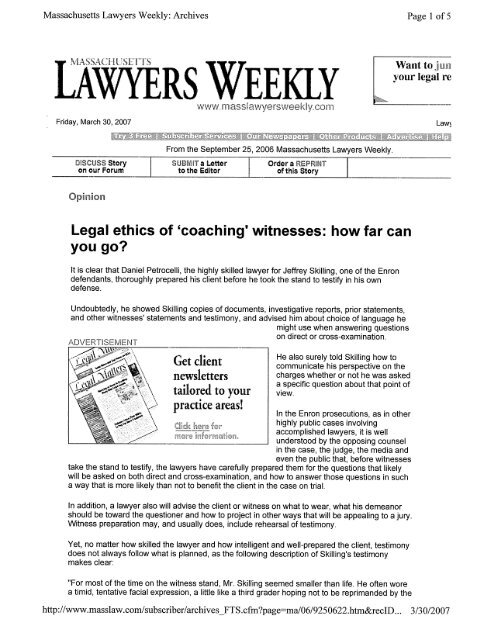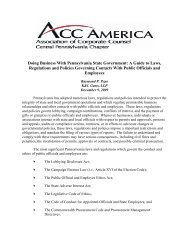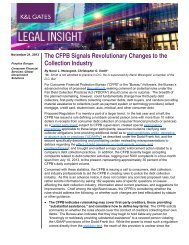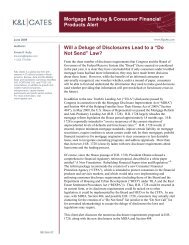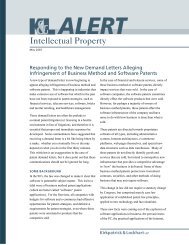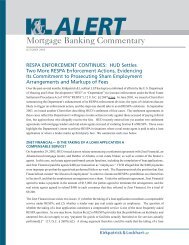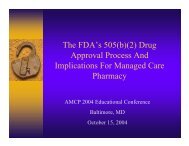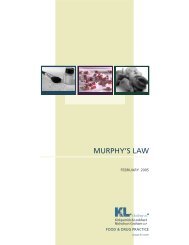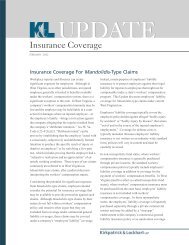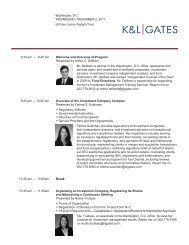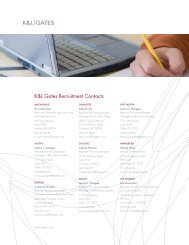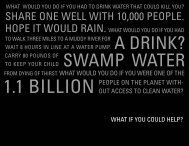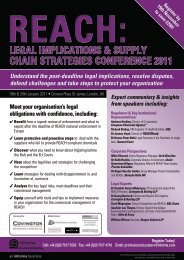Legal ethics of coaching witnesses: how far can you go?
Legal ethics of coaching witnesses: how far can you go?
Legal ethics of coaching witnesses: how far can you go?
You also want an ePaper? Increase the reach of your titles
YUMPU automatically turns print PDFs into web optimized ePapers that Google loves.
Massachusetts Lawyers Weekly : Archives Page I <strong>of</strong> 5<br />
Friday, March 30, 2007<br />
EEKLY<br />
iy.coni<br />
P<br />
Want u t<br />
<strong>you</strong>r legal re<br />
e~l<br />
Laws<br />
DISCUSS Story<br />
on our Forum<br />
From the September 25, 2006 Massachusetts Lawyers Weekly .<br />
SUBMIT a Letter<br />
to the Editor<br />
Order a REPRINT<br />
<strong>of</strong> this Story<br />
Opinio n<br />
<strong>Legal</strong> <strong>ethics</strong> <strong>of</strong> `<strong>coaching</strong>' <strong>witnesses</strong> : <strong>how</strong> <strong>far</strong> <strong>can</strong><br />
<strong>you</strong> <strong>go</strong>?<br />
It is clear that Daniel Petrocelli, the highly skilled lawyer for Jeffrey Skilling, one <strong>of</strong> the Enron<br />
defendants, thoroughly prepared his client before he took the stand to testify in his own<br />
defense .<br />
Undoubtedly, he s<strong>how</strong>ed Skilling copies <strong>of</strong> documents, investigative reports, prior statements,<br />
and other <strong>witnesses</strong>' statements and testimony, and advised him about choice <strong>of</strong> language h e<br />
might use when answering questions<br />
on direct or cross-examination ,<br />
Get client<br />
newsletters<br />
a cre to <strong>you</strong>r<br />
practice areas!<br />
He also surely told Skilling <strong>how</strong> to<br />
communicate his perspective on the<br />
charges whether or not he was asked<br />
a specific question about that point <strong>of</strong><br />
view .<br />
In the Enron prosecutions, as in other<br />
highly public cases involving<br />
accomplished lawyers, it is well<br />
understood by the opposing counsel<br />
in the case, the judge, the media and<br />
even the public that, before witnesse s<br />
take the stand to testify, the lawyers have carefully prepared them for the questions that likely<br />
will be asked on both direct and cross-examination, and <strong>how</strong> to answer those questions in such<br />
a way that is more likely than not to benefit the client in the case on trial .<br />
In addition, a lawyer also will advise the client or witness on what to wear, what his demeanor<br />
should be toward the questioner and <strong>how</strong> to project in other ways that will be appealing to a jury .<br />
Witness preparation may, and usually does, include rehearsal <strong>of</strong> testimony .<br />
Yet, no matter <strong>how</strong> skilled the lawyer and <strong>how</strong> intelligent and well-prepared the client, testimony<br />
does not always follow what is planned, as the following description <strong>of</strong> Skilling's testimony<br />
makes clear:<br />
"For most <strong>of</strong> the time on the witness stand, Mr. Skilling seemed smaller than life . He <strong>of</strong>ten wore<br />
a timid, tentative facial expression, a little like a third grader hoping not to be reprimanded by the<br />
http ://www.masslaw. com/subscriber/archives_FTS .cfm?page=ma/06/92 5 0622.htm&recID . . . 3/30/2007
Massachusett s Lawyers Weekly : Archives Page 2 <strong>of</strong> 5<br />
teacher. But at least once a day he would have momentary meltdowns, and all the bitterness,<br />
sarcasm and self-pity would creep to the surface -- only to be damped back down by Mr .<br />
Petrocelli. In the course <strong>of</strong> answering a question about Mr . Fastow's crimes, for instance, Mr .<br />
Skilling took an unprompted swipe at the F .B .I. - an incredibly foolhardy thing to do in front <strong>of</strong> a<br />
jury . When <strong>you</strong>'re on the witness stand, fighting for <strong>you</strong>r life, there is nothing more important<br />
than being disciplined in what <strong>you</strong> say and <strong>how</strong> <strong>you</strong> act . . ." 1<br />
The rules<br />
There is nothing wrong with preparation <strong>of</strong> a witness . Lawyers who litigate, and even the public,<br />
are well aware that witness-<strong>coaching</strong> is, as one commentator suggested, "not just<br />
commonplace, it's endemic ."<br />
However, most lawyers prefer to describe what they do as "witness preparation" rather than<br />
"<strong>coaching</strong>," In fact, the failure to adequately prepare a witness might fall with the scope <strong>of</strong> legal<br />
malpractice and/or a violation <strong>of</strong> the ethical rules . 2<br />
The key, ins<strong>of</strong>ar as the ethical rules are concerned, is that the foundation <strong>of</strong> the testimony must<br />
be what the witness <strong>can</strong> truthfully testify and not just what the lawyer or the client thinks would<br />
be best for the case or the client .<br />
There are several ethical rules that specifically apply to witness preparation . These are Rules<br />
1 .2(d), 3 .3 (a)(3), 3 .4 (b) and 8 .4 (c), (d) and (h) .<br />
* Rule 1 .2(d) prohibits a lawyer from counseling or assisting a client in a fraudulent or criminal<br />
act. Concocting false testimony is a fraud on the court .<br />
* Rule 3.3(a)(3) prohibits a lawyer from knowingly <strong>of</strong>fering evidence that he knows to be false<br />
and requires that a lawyer who knows that a witness presented by the lawyer has <strong>of</strong>fered<br />
material evidence that the attorney comes to know was false, must take reasonable remedial<br />
measures including, if necessary, disclosure to the tribunal ,<br />
* Rule 3.4(b) prohibits a lawyer from falsifying evidence and/or counseling or assisting a witness<br />
to testify falsely .<br />
* Finally, Rule 8 .4(c) makes it pr<strong>of</strong>essional misconduct for an attorney to engage in conduct<br />
involving dishonesty, fraud, deceit or misrepresentation, and Rule 8 .4(d) makes it pr<strong>of</strong>essional<br />
misconduct to engage in conduct that is prejudicial to the administration <strong>of</strong> justice . In addition, in<br />
Massachusetts, Rule 8 .4(h) makes it pr<strong>of</strong>essional misconduct for a lawyer to engage in any<br />
other conduct that adversely reflects on the lawyer's fitness to practice law .<br />
Blatant misconduct<br />
There also are some clear lines that define what <strong>can</strong>not be done . For example, in the federal<br />
prosecution <strong>of</strong> Zacarias Moussaoui, everyone, including the judge, the prosecution and the<br />
defense were shocked and outraged when it became known that a lawyer from th e<br />
Transportation Security Administration, Carla Martin, had allegedly "coached" seven <strong>witnesses</strong>,<br />
all <strong>of</strong> whom were scheduled to testify about aviation security .<br />
The Martin situation was, in many ways, extraordinary because, if true, her "<strong>coaching</strong>" violated<br />
Rule 615 <strong>of</strong> the Federal Rules <strong>of</strong> Evidence . This rule, entitled "Exclusion <strong>of</strong> Witnesses," allows a<br />
judge to sequester <strong>witnesses</strong> so that they <strong>can</strong>not hear the testimony <strong>of</strong> other <strong>witnesses</strong> .<br />
As the advisory committee note to this rule states : "The efficacy <strong>of</strong> excluding or sequestering<br />
<strong>witnesses</strong> has long been recognized as a means <strong>of</strong> discouraging and exposing fabrication,<br />
inaccuracy, and collusion ." citing 6 Wigmore Sects . 1837-1838 .<br />
http ://www.masslaw.com/subscriber/archives_FTS.cfm?page=ma/06/9250622.litm&recID . . . 3/30/2007
Massachusetts Lawyers Weekly : Archives Page 3 <strong>of</strong> 5<br />
In addition to this rule, on Feb . 22, in a pretrial order, the trial judge explicitly barred all but two <strong>of</strong><br />
the prosecution's <strong>witnesses</strong> from being present in the courtroom prior to their own scheduled<br />
testimony and barred all but these two <strong>witnesses</strong> from reviewing transcripts <strong>of</strong> other <strong>witnesses</strong> .<br />
Martin is not only alleged to have violated Rule 615 and the judge's specific order, but she left an<br />
e-mail trail <strong>of</strong> her breach . In these e-mails, Martin informed the <strong>witnesses</strong> <strong>of</strong> her opinion that the<br />
prosecutors, in their opening statements, had left "big gaps in the case ." She advised <strong>witnesses</strong><br />
that they had their work cut out for them, that they had to get around certain problems with the<br />
evidence, and that "we MUST emphasize the deterrent value <strong>of</strong> the measures ."<br />
One <strong>of</strong> the <strong>witnesses</strong> informed the prosecutors <strong>of</strong> the e-mails and the <strong>go</strong>vernment subsequently<br />
came forward and reported her alleged misconduct . After a hearing, the judge, who described<br />
Martin's conduct as "egregious," barred these particular <strong>witnesses</strong> from testifying in this case .<br />
According to published sources, she presently is under investigation by both the U .S. Attorney's<br />
Office and a lawyer disciplinary board in Pennsylvania, where she is a member <strong>of</strong> the bar .3<br />
Such blatant misconduct, while very unusual, is not unheard <strong>of</strong> . In Matter <strong>of</strong> Foley, 439 Mass .<br />
324 (2003), the respondent lawyer admitted to assisting a client4 in concocting a false story<br />
intended to raise a defense in a gun-carrying case . Even though the false testimony never was<br />
presented in court, it was communicated to the assistant district attorney in the case prior to<br />
being abandoned by the lawyer.<br />
In Foley, the lawyer not only did not discourage his client about testifying falsely and expressed<br />
no reservations about his doing so, but planted the seeds for the fabricated defense with the<br />
prosecutor and, over a two-week period, proceeded to manufacture a scenario to explain the<br />
false testimony .<br />
Even though he subsequently abandoned this ill-conceived plan, the court considered his<br />
misconduct to be "serious and deliberate ." Foley was suspended for three years for his<br />
misconduct, which the court described as an affirmative fabrication <strong>of</strong> a defense and the<br />
solicitation <strong>of</strong> false testimony to support it .<br />
There are two other cases <strong>of</strong> note in Massachusetts where the lawyers clearly crossed the lines<br />
drawn in the Rules <strong>of</strong> Pr<strong>of</strong>essional Conduct .<br />
In Matter <strong>of</strong> Gross, 435 Mass. 445 (2001), the court suspended a lawyer for 18 months for<br />
soliciting a client and alibi witness to engage in an impersonation scheme before a court, and in<br />
Matter <strong>of</strong> McCarthy, 416 Mass. 423 (1993), the court imposed a one-year suspension for a<br />
lawyer who elicited false testimony and presented false documents in an administrative<br />
proceeding .<br />
Proceed with caution<br />
There are a few particular areas in which lawyers should be especially careful .<br />
First, although a lawyer is prohibited from counseling or assisting in conduct he knows is<br />
criminal or fraudulent, he still may discuss the consequences <strong>of</strong> any proposed course <strong>of</strong> conduct<br />
with a client and may counsel or assist a client to make a <strong>go</strong>od-faith effort to determine the<br />
validity, scope, meaning or application <strong>of</strong> the law. (Rule 1 .2(d) )<br />
As Comment [6] notes, <strong>how</strong>ever, "there is a critical distinction between presenting an analysis <strong>of</strong><br />
legal aspects <strong>of</strong> questionable conduct and recommending the means by which a crime or fraud<br />
might be committed with impunity ."<br />
I always advise my lawyer clients to make clear to their clients that they <strong>can</strong>not advise them<br />
regarding any future or proposed criminal conduct, and, to <strong>go</strong> one step further, tell them they<br />
should not commit the proposed criminal or fraudulent conduct .<br />
http://www. masslaw. corn/subscriberlarchives_FT S. cfm?page=ma106192 50622 .htm&recID . . . 3/30/2007
Massachusetts Lawyers Weekly : Archives Page 4 <strong>of</strong> 5<br />
Second, while a lawyer shall not <strong>of</strong>fer evidence he knows to be false, the attorney has discretion<br />
to refuse to <strong>of</strong>fer evidence he reasonably believes to be false, (Rule 3 .3(c)) This is an area<br />
fraught with danger and must be handled very carefully . Clients may not fully grasp the<br />
ramifications <strong>of</strong> presenting false testimony and must be advised <strong>of</strong> the potential consequences .<br />
Finally, the general misconduct rules - Rules 8,4(c), (d) and (h) (in Massachusetts only) -<br />
have been broadly interpreted to include a wide variety <strong>of</strong> conduct and should be reviewed<br />
carefully when any <strong>of</strong> the issues raised above in this article arise .<br />
Conduct that may not fit into Rules 1 .2(d), 3.3 and 3 .4, may very well fit into the broader<br />
cate<strong>go</strong>ry <strong>of</strong> pr<strong>of</strong>essional misconduct prohibited in Rule 8 .4 .<br />
Endnotes<br />
1 Brad DeLong's Semi-Daily Journal : April 17, 2006, quoting Joe Nocera on Jeffrey Skilling in<br />
the New York Times .<br />
2 Rule 1 .1 <strong>of</strong> the Rules <strong>of</strong> Pr<strong>of</strong>essional Conduct defines competent representation as requiring<br />
"the legal knowledge, skill, thoroughness, and preparation reasonably necessary for the<br />
representation, "<br />
3 "Investigations, Lawsuits Still Dogging 9/11 Lawyer," by Jerry Markon, Washington Post, July<br />
10, 2006, p . B01 .<br />
4 The "client" actually was an undercover agent wearing a wire who was part <strong>of</strong> a federal<br />
investigation <strong>of</strong> possible corruption in the Boston Municipal Court and whose crime was a<br />
contrived charge, a fact unknown to the arresting <strong>of</strong>ficers, the prosecutors or the court at the<br />
time. The lawyer admitted his misconduct before a federal grand jury, and while he was neither<br />
indicted nor charged with a crime in the investigation, his conduct was reported to the Office <strong>of</strong><br />
Bar Counsel, which brought disciplinary charges against him .<br />
Arnold R. Rosenfeld is <strong>of</strong> counsel in the Boston <strong>of</strong>fice <strong>of</strong> Kirkpatrick & Lockhart, Nicholson,<br />
Graham . He also currently is a visiting pr<strong>of</strong>essor at Boston University School <strong>of</strong> Law and is an<br />
adjunct pr<strong>of</strong>essor at Northeastern University School <strong>of</strong> Law . He served as chief bar counsel <strong>of</strong><br />
the Board <strong>of</strong> Bar Overseers from 1991 to 1999 .<br />
@ 2006 Lawyers Weekly Inc., All Rights Reserved .<br />
DISCUSS Story<br />
on our Forum<br />
SUBMIT a Letter<br />
to the E+dltor<br />
Order a REPRINT<br />
<strong>of</strong> this Story<br />
User Agreement For Subscriber-Only Online Benefits ( Help I Our Privacy Policy<br />
Send any questions or comments to comments@lawyersweekly .co m<br />
Subscriber Services : 1-800451-9998 Technical Support : 1-800-444-5297 ext . 8156<br />
@ Copyright 2007 Lawyers Weekly, Inc. All Rights Reserve d<br />
DOLANME!!1#1<br />
Lawyers Weekly does not use spyware ; <strong>how</strong>ever, we link to a number <strong>of</strong> other sites and do not take responsibility for any spyware they<br />
i<br />
http://www.masslaw.comisubscriberlarchives_FTS . cfm?page=ma1061925 0622 .htm&recID . . . 3/30/2007


